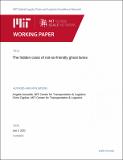The Hidden Costs of Not-So-Friendly Ghost Lanes
Author(s)
Acocella, Angela; Caplice, Chris
DownloadMain article (1.570Mb)
Metadata
Show full item recordAbstract
Firms’ (shippers’) procurement of truckload (TL) transportation services is a costly, time-intensive process.
The result of these months-long procurement events is typically thousands of contracts between the shipper
and transportation service providers (carriers) covering each of the shipper’s lanes (origin-destination pairs)
over which it distributes products. Due to TL supply and demand uncertainty, shippers often adopt a
coverage strategy to ensure contracted capacity is secured on combinations of lanes on which demand is
expected. However, this strategy leads to unnecessary costs and inefficiencies.We find that a large percentage
of shippers’ lanes never end up being utilized. We refer to contracted lanes on which no business materializes
as ghost lanes. In this study, we characterize ghost lanes to help shippers identify which lanes need not be
contracted in the first place to reduce existing startup costs. When none of the expected business on ghost
lanes materializes, this disrupts carriers’ network balance and operating efficiencies and impacts service levels
to other customers. We empirically demonstrate how the disruptions from ghost lanes from a shipper in one
year factor into carriers’ performance and pricing decisions the following year. Moreover, for the lanes that
are characteristically ghost lanes but that do materialize, carrier rejection rates are high as are contract
prices relative to spot market prices - in other words, shippers are overpaying anyway. We conclude by
recommending that firms reconsider their coverage approach to TL transportation procurement by excluding
lanes with high probability of becoming ghost lanes (in particular, new lanes) from the traditional annual
procurement process.
Date issued
2022-07-04Department
Massachusetts Institute of Technology. Center for Transportation & LogisticsSeries/Report no.
SCALE Working Paper Series;2022-mitscale-ctl-03
Keywords
Freight procurement, Truckload, Empirical research